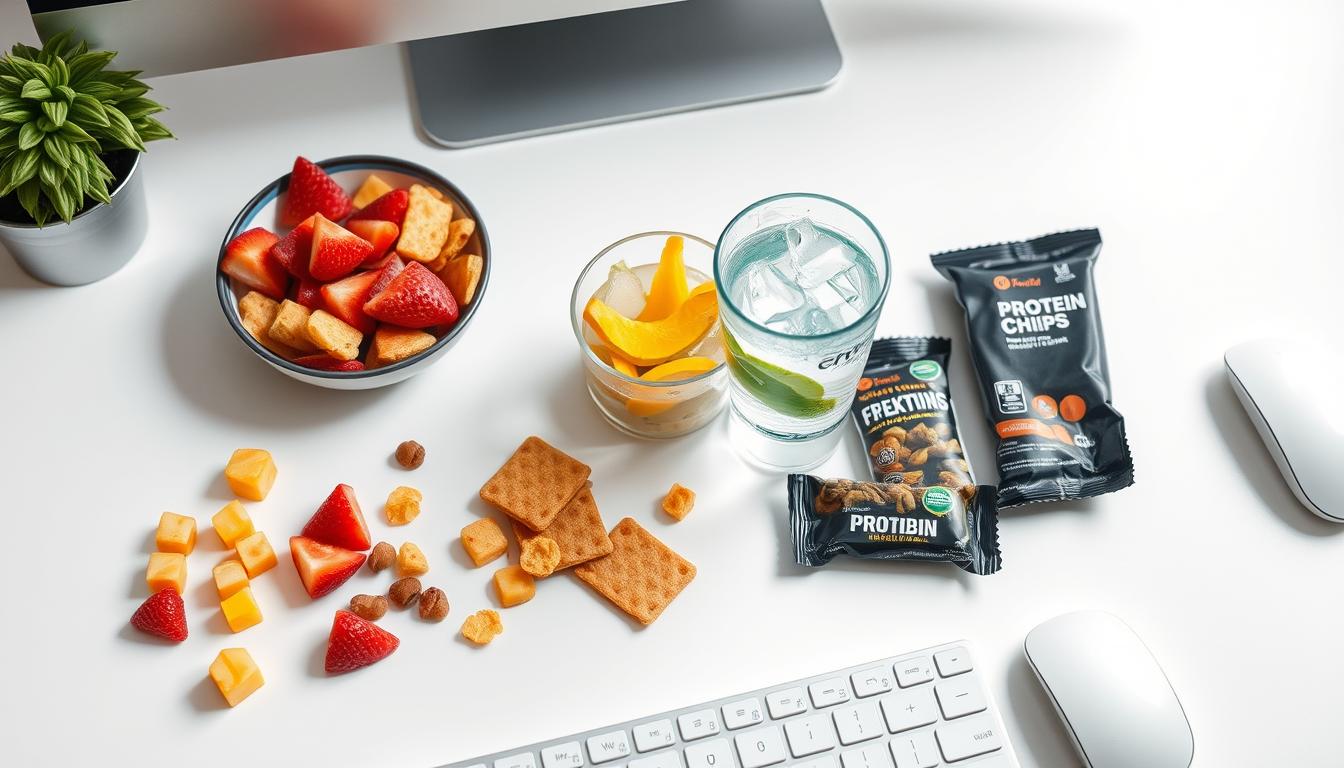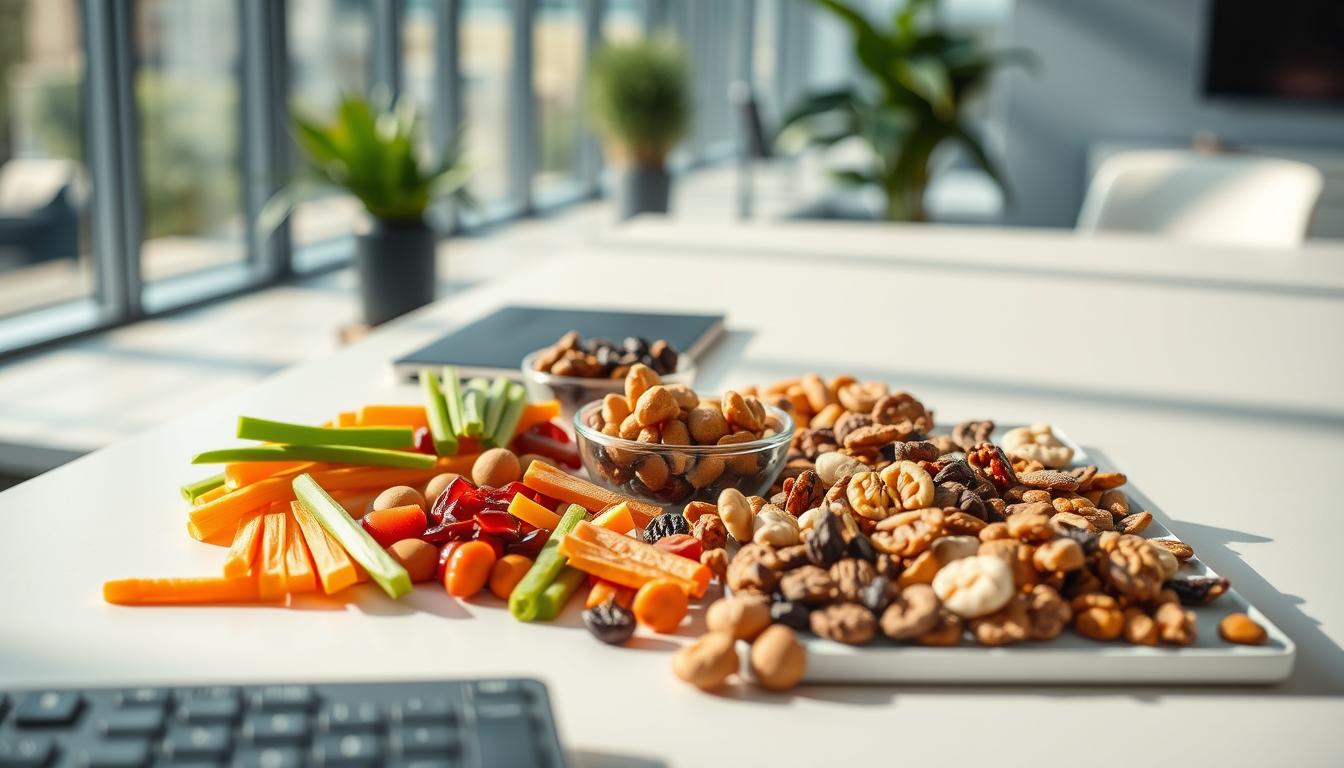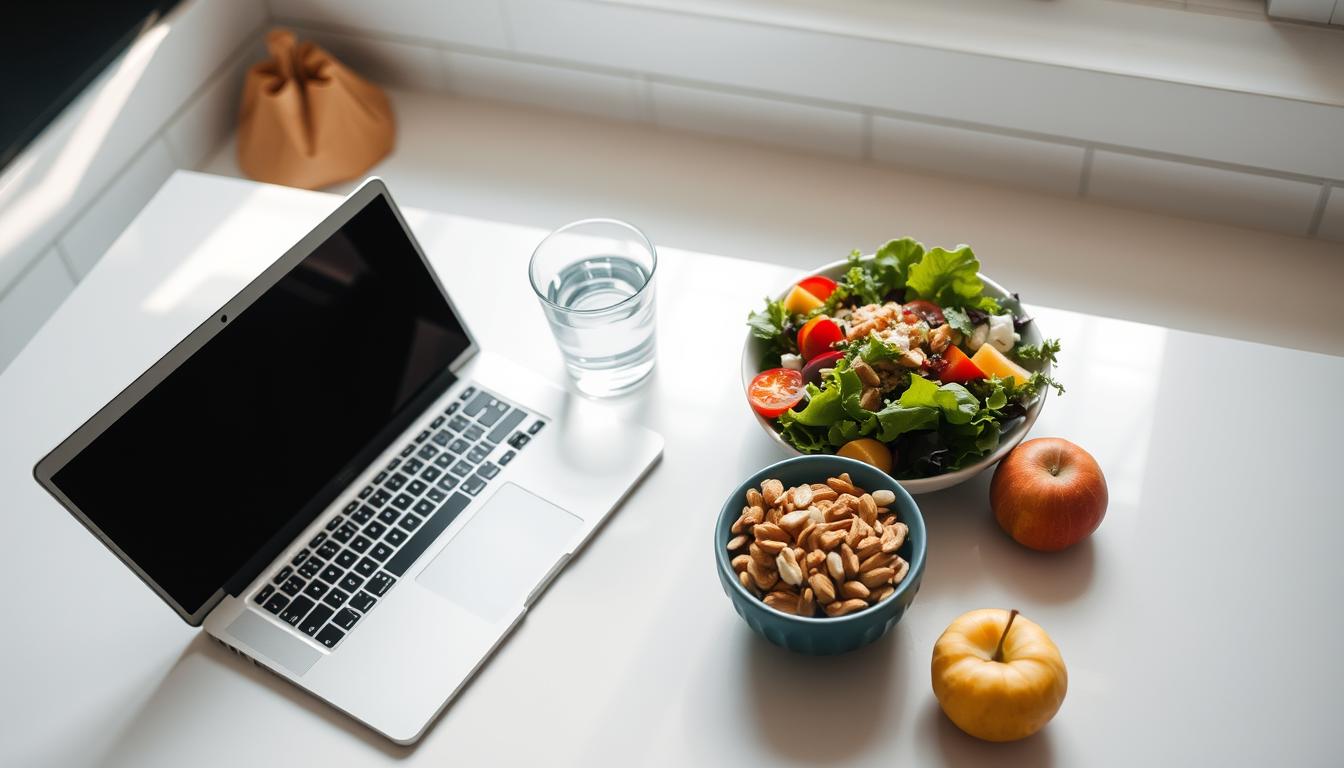In today’s fast-paced work world, it’s key to have tidy eating habits at your desk for health. Many people spend a lot of time in front of computers and need to eat healthily there. This guide will show you how to eat clean at work effectively.
Keeping your eating area clean promotes health and increases productivity. With smart strategies, eating at your desk can be enjoyable and healthy.
The Importance of Clean Eating Habits
Adopting clean eating habits is key for better health and more energy at work. Eating right keeps your energy steady all day. If you eat poorly, you might feel tired and do worse at your job and in life.
Enhancing Health and Productivity
Eating well helps you work better. A diet rich in fruits and veggies keeps you alert and focused. Studies have found that good food improves your thinking, helping you work better.
It’s easy to eat healthily if you plan ahead. Keep ready-to-eat veggies and nuts with you to avoid junk food.
Reducing Risks of Chronic Diseases
Eating clean decreases your chances of getting long-term sicknesses. Studies show healthy eating lowers the risk of many diseases. The World Health Organization advises eating less sugar and salt to stay healthy.
Choosing smart foods lowers the chance of serious health issues. This can make a big difference in your health over time.
Understanding Clean Eating
Clean eating focuses on healthy nutrition and natural foods. It means eating more fruits, vegetables, lean proteins, whole grains, and healthy fats. Avoiding processed foods with lots of additives and sugar helps people choose better for their health.
Defining Clean Eating
Clean eating means eating foods as close to their natural state as possible. This includes choosing organic foods and avoiding those with chemicals and preservatives. Americans eat way too much sugar, around 28 teaspoons a day, which is much higher than the 6-9 teaspoons recommended for adults. Clean eating helps reduce sugar intake and improve overall nutrition.
Identifying Healthy Food Choices
Finding healthy foods involves looking for those with high nutritional value. Eating at least five servings of fruits or vegetables each day lowers the risk of diseases like heart disease, diabetes, and cancer. Choosing whole grains over refined ones adds more fiber and antioxidants to our diet.
When buying processed foods, pick those with simple ingredients, like whole-grain pasta or plain yogurt. These choices can greatly improve our health.
Benefits of Tidy Eating Habits at Your Desk
Eating well at your desk does more than just quiet hunger. It can boost your focus and give you more energy. It can also help you feel less stressed during the day. Workers who eat healthily get distracted less. This makes the whole office more productive.
Improved Focus and Energy Levels
Having healthy snacks like whole grain crackers, nuts, and fruit at your desk can give you a quick energy lift. Foods high in protein and whole grains help your brain work better. This makes it easier to focus on your tasks. Eating these foods regularly keeps your energy up and helps you dodge the mid-afternoon slump.
Reducing Stress and Fatigue
Eating mindfully means enjoying your food and knowing when you’re full. A tidy desk reduces stress by cutting down on clutter. Tidy eating habits and a clean desk improve your health and clear your mind.
Choosing healthy snacks and preparing meals also gives you more control over what you eat. This approach to eating at work makes everyone more satisfied and productive.
Tips for Mastering Tidy Eating Habits at Your Desk
Working on tidy eating habits can greatly improve your health. Planning your meals and packing healthy lunches helps control portions and ensures you get the nutrients you need. Making smart food choices boosts your energy and productivity at work.
Pack Nutritious, Portion-Controlled Lunches
For better meal prep, mix in whole grains, lean proteins, and fiber-rich foods. A well-balanced meal gives you good nutrition and keeps you from choosing unhealthy foods last minute. Try adding smoothie bowls for a tasty and eye-catching desk meal. Also, cleaning up right away and keeping your space tidy helps you stick to your eating goals.
Incorporate Fresh Fruits and Vegetables
Eating fresh fruits and veggies as snacks promotes healthier habits. Keeping them in sight at your desk lowers the temptation for junk food. This makes you more likely to eat healthy snacks instead of processed ones. Clearing your desk of clutter also helps cut down on cravings. Using a food journal or app can make you more conscious of your choices, leading to better meal planning and lunch packing.
Choosing Healthier Snacks
Choosing the right snacks is key to staying healthy. Instead of processed snacks, try eating whole foods. These choices boost your nutrition and keep your energy up. They also make you more aware of what you eat and keep you hydrated. This is great for your body and brain.
Swap Processed Snacks for Whole Foods
Processed snacks are full of sugar, preservatives, and bad fats. Instead, go for whole foods. They’re packed with good nutrition. Here are some tasty options:
- Nuts and dried fruit deliver healthy fats, protein, and fiber to keep you satisfied.
- Roasted chickpeas serve as a high-protein and fiber-rich alternative, easily made at home.
- Guacamole paired with bell peppers provides heart-healthy monounsaturated fats.
- Baked veggie chips can be a nutritious substitute for traditional chips with minimal ingredients.
- Tuna pouches are compact, high in protein, and rich in omega-3 fatty acids.
- Edamame offers a plant-based protein option along with healthy fats.
- Dark chocolate-covered nuts contribute antioxidants and anti-inflammatory benefits.
- Hard-boiled eggs pack plenty of protein and essential nutrients.
- Cottage cheese topped with fruit balances carbs and protein.
- Smoked salmon on whole-grain crackers provides omega-3s and unique taste.
- Seaweed snacks are a low-calorie choice rich in iodine for thyroid health.
- Homemade granola made from oats, nuts, seeds, and honey is a customizable snack.
Hydration: The Key to Mindful Eating
Being hydrated is crucial for controlling hunger. Drink water throughout the day. It can stop you from snacking when you’re just thirsty. Try these hydrating snacks:
- Pre-cut veggies such as carrots, celery, and bell peppers for crunch and hydration.
- Make trail mix with nuts, seeds, and unsweetened dried fruit for a portable and refreshing option.
Pack snacks in small containers to keep portions right and food fresh. Prep snacks like apple slices with almond butter ahead of time for easy, healthy choices. Have whole-grain crackers, hummus, or low-fat cheese ready to avoid bad snacking.
Strategies to Avoid Common Eating Triggers
Finding out what causes us to eat can help us develop better eating habits. It’s important to know why and when we choose to eat, especially when we’re not hungry. Realizing how stress or boredom affect our eating can prevent unplanned snacking.
Identifying Emotional and Environmental Cues
Start with a food diary to observe your eating habits. By recording what, when, and why you eat, you’ll notice patterns. Being mindful of triggers, like snacking while watching TV or eating too much when stressed, is key. You can then change your surroundings to avoid these triggers.
Minimize Distractions to Enhance Awareness
Eating without distractions leads to a more mindful meal. Aim to eat in places like the dining room, not in front of the TV. This helps you focus on your food and realize when you’re truly full. Sharing meals also makes eating a social and slower process.
Instead of eating when you’re bored or stressed, find other activities. A quick walk or meditation can stop you from overeating. Having healthy options like fruits ready makes choosing healthy snacks easier.

Meal Planning for Successful Desk Dining
Effective meal planning is key for great desk dining. It helps you eat well during busy workdays. By planning and preparing meals ahead, you avoid unhealthy fast food. This keeps your energy up all day.
Creating a Weekly Meal Prep Routine
Having a meal prep routine makes desk dining better. Here’s how to do it:
- Use Sunday nights to plan your meals for the week.
- Cook proteins like chicken or tofu and grains such as brown rice ahead of time.
- For snacks and meals, use small and large containers respectively for portion control.
- Prepare a lunch rich in protein and veggies the night before to avoid quick choices.
- Choose glass containers with tight lids for safe carrying and storage.
Making Clean Eating Convenient
Eating right at your desk is easier with these tips:
- Keep water nearby to stay hydrated.
- Eat more pre-cut fruits and veggies for easy snacks.
- Have nuts, seeds, and whole grain crackers in your drawer for quick munching.
- Swap sugary drinks for flavored water or tea with a SodaStream for healthier sipping without the sugar.
- Avoid buying junk food to keep your eating area healthy and reduce mindless eating.
Maintaining Tidy Eating Habits with Flexible Options
Being flexible is key to keeping eating habits tidy, especially in today’s fast work world. Using leftovers for desk meals makes eating nutritious food easy without needing extra prep. This way, meal planning becomes simpler, and it turns potential waste into delicious, handy lunches.
Incorporating Leftovers into Desk Meals
Leftovers can change the way we eat at work. Cooking in big batches means you have meals ready for the whole week. With bento boxes or lunch containers, everything stays organized, and cooling packs keep food fresh. This flexible eating plan helps you eat clean easily, even when work gets busy.
Adapting to Workplace Environment and Culture
The culture at work affects how we eat. Promoting a clean and organized eating space leads to healthier choices. Adding healthy snacks like nuts, fruits, and protein bars to shared areas helps. Plus, potlucks focused on nutritious food build community and support tidy eating habits. Meal planning apps also make organizing meals easy, helping you be ready for the day.
Conclusion
Eating well at work is key for better health and work performance. Clean eating boosts energy and cuts stress and disease risk. Keeping your workspace clean and choosing healthy foods can improve your lunchtime.
Meal planning and eating nutrient-rich snacks are smart steps. Know what triggers your eating habits. Taking breaks for some air or doing mindfulness exercises can boost your well-being at work. Small, steady changes make work more enjoyable and energetic.
Eight out of ten Americans eat at their desks, showing we need to eat cleanly for our health. Staying hydrated, not snacking without thinking, and organizing your desk boosts productivity and health. Clean eating habits make work healthier and more productive.



